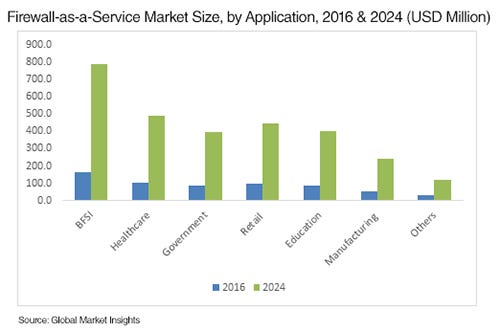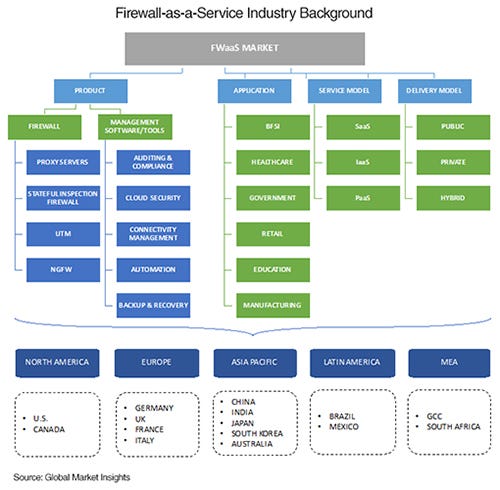The complexity of managing firewalls can be overwhelming. A cloud-based option might be better.
May 10, 2018


Saif Ali Bepari
By Saif Ali Depari, Content Writer (Research) at Global Market Insights
Firewalls, while critical to securing data, do have some glaring shortcomings, not the least of which is the effort it takes to maintain them. Firewall as a service just may be a better way to safeguard company data.
Businesses are finding that the consequences of having weak and vulnerable security systems can be catastrophic, making a robust and fully functional firewall crucial to preventing data breaches. However, the added complexity of managing firewalls can overwhelm an already overburdened IT team. Instead, organizations should consider turning to a firewall delivered as a cloud-based option, or firewall-as-a-service.
 One of the foremost pure software management systems vendors, FireMon, which also partakes in the FWaaS market, recently unveiled the outcomes of a comprehensive survey of network security professionals conducted in 2017 on the criticality of firewalls to avert data leaks.
One of the foremost pure software management systems vendors, FireMon, which also partakes in the FWaaS market, recently unveiled the outcomes of a comprehensive survey of network security professionals conducted in 2017 on the criticality of firewalls to avert data leaks.
The survey found that 72 percent of the respondents believe that if firewalls are not configured appropriately, the massive funds being spent on securing IT infrastructure will be wasted. Therefore, as public and private enterprises gradually realize the importance of adopting firewalls, the global FWaaS industry is bound to attain a prominent position in safeguarding crucial data and information across the globe.
Apart from being deployed extensively across numerous business verticals, firewalls have found wide acceptance in various other applications as well.
Educational Institutions Turn to Advanced Firewalls
With an inherent goal of sharing information and knowledge to encourage educational achievement, leading institutions of higher learning more and more are offering open online courses. However, as a consequence of this openness, these universities’ IT networks have been left vulnerable to various cyberthreats. Subsequently, many renowned educational institutions have begun to modernize their network resources.
Penn State University, for instance, as part of its cybersecurity initiative, is upgrading numerous decentralized firewall systems to a next-generation enterprise firewall platform. The Office of Information Security has teamed up with Penn State’s IT cell to shield the computer networks of the university. Moreover, to ensure the security of the entire university community and to combat highly damaging cyberattacks, a number of projects are being undertaken to propel Penn State toward a more information-centric and integrated approach to cybersecurity.
Penn State is just one example: More such instances of building progressive firewalls are underway at notable universities worldwide. Needless to say, the major players in the FWaaS market are anticipated to shoulder the vital responsibility of delivering on the…
…diverse demands of globally renowned educational hubs.
Preserving Critical National Infrastructure
 Government agencies across developed and emerging nations plan to set up cutting-edge firewalls as well.
Government agencies across developed and emerging nations plan to set up cutting-edge firewalls as well.
Following multiple global ransomware attacks in mid-2017, the Indian government is in the process of establishing a national firewall to protect state-owned banks, companies, government websites and critical data servers. The Ministry of Electronics and Information Technology is said to be the nodal agency that will supervise the formation and implementation of the firewall.
Apparently, the soon-to-be-developed firewall will provide significant protection to numerous Indian firms that are not well-prepared to thwart high-level organized cyberattacks. The successful execution of the national firewall will be a critical milestone for the overall FWaaS industry fraternity in India.
The United Kingdom is also embracing and promoting advanced cybersecurity solutions on a wide scale. The UK government has already launched its National Cyber Security Strategy 2016-2021, which calls for an investment of 1.9 billion euros over the next five years to significantly transform the cybersecurity preparedness of the nation. Concurrently, under the aegis of this ambitious plan, a National Cyber Security Centre has been formed to monitor the establishment of firewalls, address systemic vulnerabilities, share valuable insights and provide leadership on key national cybersecurity issues.
These examples are just the start. As governments and businesses across numerous industries invest in refining and upgrading the cloud security and automation of firewalls, the global FWaaS market is set to gain enormous popularity in the near future.
Another advantage of FWaaS is that, with the rise of reverse-engineering devices and software, modern-age hackers have been making concerted efforts to misconfigure existing firewalls. Consequentially, even a simple misconfiguration in the firewall exposes serious vulnerabilities in any enterprise network. Furthermore, to tackle loopholes such as inconsistent optimization of firewalls, business downtime and policy guidelines infringement, a host of major firewall industry participants have been focusing on releasing multifunctional next-generation firewalls.
With an unprecedented rise in cybercrimes over the past decade, the significance of employing firewalls to safeguard data cannot be stressed more. Encompassing a range of applications in the Banking, Financial Services and Insurance (BFSI), Government, Healthcare, Education, Retail and Manufacturing sectors, the firewall-as-a-service market has its task cut out for it. However, with overall industry share anticipated to register a compound annual growth rate of 25 percent from now to 2024, the potential for profit is great for FWaaS players.
Saif Ali Bepari develops content for multiple online platforms pertaining to the market research industry. Having had prior experience in creative and technical writing, he now writes detailed blog posts on a range of business verticals, including health care and medical devices, bulk and specialty chemicals, sustainable and smart technologies, automotive and transportation, etc.
Read more about:
AgentsYou May Also Like
